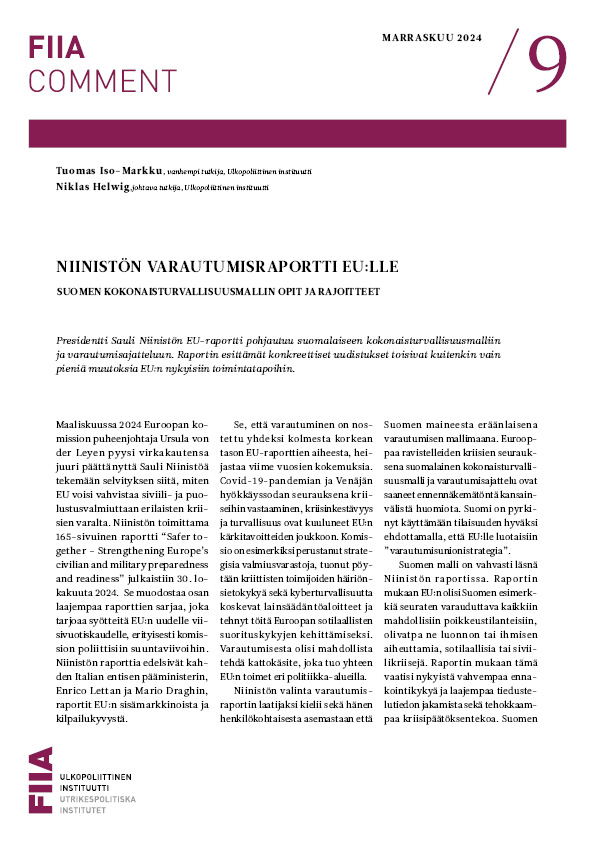On 14 June the European Commission was granted the mandate to launch negotiations on a comprehensive trade and investment agreement with the United States. Reaching a deal is vital for both parties but a successful outcome risks being compromised by political sensitivities on both sides of the Atlantic.
In its 14 June session on foreign affairs, the Council of the European Union authorised the European Commission to launch negotiations on a Transatlantic Trade and Investment Partnership (TTIP) with the United States. The timely approval of the Commission’s mandate made it possible for the EU and the US to ceremonially open the negotiations at the G8 meeting in Northern Ireland at the beginning of the week.
The partners are aiming at a state-of-the-art accord that would constitute the most ambitious trade agreement reached since the formation of the World Trade Organization in 1995. While a significant deal is no longer expected to emerge from the WTO’s Doha Round, the TTIP would provide a crucial source of growth without burdening European and American taxpayers’ wallets.
The accord would provide for a deeper integration of the EU and US markets as a whole. Instead of talking about a free trade agreement, both parties stress the partnership’s focus on investment and regulatory convergence. The customs duties between the two trading blocks are already low. The most effort is thus being put into removing unnecessary rules and the bureaucratic burden that make it difficult to buy and sell across the Atlantic.
The exploitation of the full potential of closer cooperation would help the EU and the US to sustain their status as the world’s two largest economic powers. The aligning of the EU and US technical regulations would pave the way for international standards and thus improve the partners’ standing in global competition.
The rest of the world would undeniably benefit more from a multilateral solution. Even if the transatlantic deal is projected to increase trade and income globally, an extensive EU-US deal has the potential to cause damage to outsiders, both to advanced and emerging economies.
The attainment of deep integration is, however, being jeopardised by political divisions on both sides of the continent. The run-up to the Council meeting of 14 June was filled with suspense as France threatened to block the entire negotiations unless all audio-visual issues were taken off the agenda completely.
Karel De Gucht, the EU trade commissioner, desperately sought to keep the mandate as broad as possible, but ultimately had to give in to the French demands. Even though the Commission has the possibility to ask for additional negotiating directives at a later stage, it is unlikely that France will renege on its stand.
Omitting the entire audio-visual sector is inconsistent with the promise by both parties to keep all industries on the negotiating table. Prior restriction of the scope of the agreement opens the door for Washington to take a protective stand on its own favoured industries. Instead of an outright exclusion, the European commitments could have been formulated in the course of the negotiations in a way that would have avoided an overly negative impact on the European film and television industry.
Goods feature surprisingly high on the EU’s negotiation agenda. More emphasis could have been put on services, where there is an acute need to improve market access in both the EU and the US. It is likely that both parties will impose certain limitations in the course of the negotiations. For the US, the most sensitive issues concern public procurement, financial services regulations, and air and maritime services. The EU is especially keen to maintain its high food safety standards.
While support for the deal is widespread on both sides of the Atlantic, there is a risk of running into a political gridlock. The EU and the US are for the first time negotiating free trade with an equal partner. Achieving the goal of regulatory convergence requires either the adoption of common regulations or mutual recognition of each other’s standards. Both options would lead to a certain loss of sovereignty.
The agreement is likely to include matters that render its approval subject to unanimous decision-making in the EU Council. The European Parliament is not directly involved in the negotiations but it must approve the final text. Finally, any parts of the agreement remaining within the EU Member States’ competence will need to be ratified according to national procedures.
On the American side, a critical tool to pass the deal is the use of the ‘fast-track’ legislative procedure which allows the White House to submit deals to Congress for straight up-or-down votes without any amendments. The previous authorisation to use the procedure expired in 2007. Obtaining a new authorisation is now necessary for the US to successfully pass both the EU deal and another partnership under negotiation: the Asia-Pacific free-trade agreement sought by the US with its trading partners across the Pacific.
Both the American and the European leaders appear zealous and determined to reach an agreement. A conclusion of the talks before the end of the current Commission’s term in October 2014 would avoid a change of EU negotiator. Neither party can afford a breakdown in negotiations as it would undermine their credibility in the eyes of the rest of the world. A genuinely integrated transatlantic market would both boost trade and promote common values at a time when the centre of economic and ideological power is shifting towards the East. Reaching these objectives, however, requires the avoidance of too much politicking and keeping the big picture in mind.








